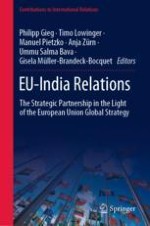2021 | OriginalPaper | Chapter
India and the European Union: A Partnership for Joining Forces on the Global Scene—Concluding Remarks and Outlook
Author : Ummu Salma Bava
Published in: EU-India Relations
Publisher: Springer International Publishing
Activate our intelligent search to find suitable subject content or patents.
Select sections of text to find matching patents with Artificial Intelligence. powered by
Select sections of text to find additional relevant content using AI-assisted search. powered by
